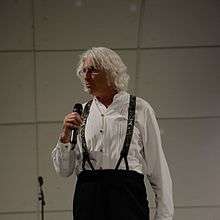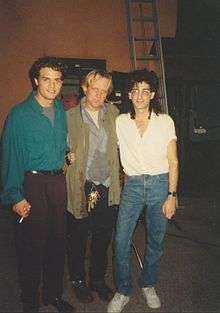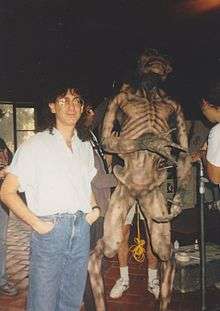Jimmy Lifton
| Jimmy Lifton | |
|---|---|
 Jimmy Lifton honoring veterans at the Lifton Institute of Media Arts & Sciences Vet 50 Gala | |
| Born |
James Ian Lifton January 13, 1955 Detroit, Michigan, U.S. |
| Residence | Valencia, Santa Clarita, California |
| Occupation | Musician, producer |
| Years active | 1978–present |
| Spouse(s) | Paulette Victor-Lifton (m. 1997; div. 2016) |
James Ian Lifton (born January 13, 1955), known as James Lifton and Jimmy Lifton, is an American musician and a producer who has worked on over 40 television and film productions. In 1983, while in Los Angeles, Lifton focused on studio work and scored symphonic-type music for the Griffith Observatory. For one of the planetary programs, Lifton played background music while science fiction writer Ray Bradbury read prose and poetry.[1] He released a song called "I'm A Man" in 1986, written by Jimmy Miller and Steve Winwood, which made it to #23 on the Billboard music charts.[2] Billboard also nominated him for "Best Independent Production Of The Year" in 1985.
Lifton's first major film production was the horror cult classic, Mirror, Mirror (1990). Since then, he has gone on to produce 18 feature films, working with such talent as Mark Ruffalo, Christina Ricci, Hulk Hogan, James Brolin, Traci Lords, and Bruce Campbell to name a few. In 1998, Lifton produced a film titled Monkey Business, which starred young rising star Shia LeBouf. Shia earned his Screen Actors Guild card from his role in the film. Lifton co-founded a post production company called Oracle Post in 1996.
Oracle Post provides picture and sound needs for feature films and television and has a client base which consists of such industry giants as Fox, HBO, NBC, Universal, Disney, Nickelodeon, Paramount, Sony, Warner Brothers and MTV.[3] Through Lifton's work with Oracle Post he has earned 15 Golden Reel Awards nominations,[4] 5 of which he won, and 5 Daytime Emmy nominations,[5][6][7][8][9] 2 of which he won for Outstanding Sound Editing – Live Action and Animation for The Penguins of Madagascar (2008)[10] and Outstanding Sound Editing – Animation for Kung Fu Panda: Legends of Awesomeness (2011).[11]
Early life
James Ian Lifton was born in the Detroit area of Michigan.[12] Lifton got an early start to his creative career and at a young age he was graced with an apprenticeship to the Master Organist for the Detroit Symphony.[12][13] In 1972, Lifton started his first serious band called Merlin, which was the first Detroit based mixed race Rock and Roll band. Merlins' most notable performances were at the People's Ballroom, in Ann Arbor, where they opened for vocalist Mitch Ryder and The Knock Down Party Band,[14] and Bob Seger. Lifton attend The Royal Conservatory of Music[12][13] from home, and earned a degree in Piano. After graduation, Lifton put Merlin on hold to further his education and moved to Boston to attend Berklee School of Music.[12][13] It was not long before Lifton decided he had learned all that he could from the education system and moved back to Michigan to actively pursue a career in the Music Industry.
Career
Music

Lifton started off his musical career at age 21, working as a studio session player for multiple Detroit based studios, most notably Don Davis's famed Motown recording studio Groovesville Productions[15][16] and Lorio Recording Studio. After gaining valuable work experience, Lifton co-founded his own record label called Orphan Records with Virginia Perfili in 1981 and released his first single titled I Want To Talk To You in 1982. Lifton released his first EP titled Untitled in 1984. The EP consisted of songs "I Wanna Talk To You", "Of Mystics", "Soldier", "Silence", "Harmony", and "Time We Were On Our Way".[17]
In 1986, Lifton collaborated with Jimmy Miller and Steve Winwood to create a cover for their timeless hit song "I'm A Man".[18] The music video for "I'm A Man" featured live performance footage as well as dancers, most notably August 1986 Playboy playmate Ava Fabian. The video was directed by David Golden, produced by Marina Sargenti, with John LeBlanc serving as cinematographer.[19][20] Lifton self promoted the video, driving the song to #23 on the Billboard Magazine charts,[21] which generated enough attention for Atlantic Records to take notice, leading them to buy the license to the song and sign Lifton to a record deal.[22]
Lifton enjoyed the process of making videos and started exploring the relatively new world of music videos. Lifton worked extensively with Bruce Nazarian and together the two produced many 12" records that appeared on Lifton's Orphan Records. Through his relationship with Bruce Nazarian, Lifton was hired in 1986 by Island Records to direct Millie Scott's music video for her song Automatic. By involving himself with making music videos, Lifton became more and more interested in the art of filmmaking. By 1987, Lifton decided to pursue his growing love for filmmaking and got his foot in the door of the film industry by working on the soundtrack of the feature film Kandyland. Through his work on Kandyland Lifton discovered he had a talent for scoring film and started involving himself with more film projects.
In 1990, Lifton released his first feature-length film titled Mirror, Mirror. Lifton produced the film as well as composed the music and worked on the mechanical effects.[23] Lifton's involvement with the film industry led him to co-founding Oracle Post with Paulette Victor-Lifton in 1996. From 1996 until the late 2000s, Lifton contributed to many film and TV productions, most notably Blade: The Series, SpongeBob SquarePants, The Penguins of Madagascar, and Kung Fu Panda: Legends of Awesomeness.[13][23][24] Lifton's Oracle Post grew to become one of the largest independent post-production audio studios in Los Angeles. Oracle post was used as the ADR facility for film productions Righteous Kill (2008), Saw V, and Superman Returns (2006), and TV shows Curb Your Enthusiasm (1999–2004), NCIS (2005–2006), Punk'd (2005–2006), and The X's (2005–2006).[13][25]
Lifton won multiple Golden Reel Awards and was nominated for multiple Daytime Emmy Awards for his work on SpongeBob SquarePants.[26][27][28] Lifton won a Daytime Emmy Award as well as multiple Golden Reel Awards for his work on The Penguins of Madagascar (2008).[10] In 2012, Lifton won a Daytime Emmy Award for his work on Kung Fu Panda: Legends of Awesomeness (2011).[5][6][7][8][9][11]
Filmmaking

Lifton's first film was the 1990 horror cult classic Mirror, Mirror[29] starring Karen Black, Yvonne De Carlo, and William Sanderson. The film was directed by Marina Sargenti and was Lifton's first film that he produced. The 1994 sequel Mirror, Mirror 2: Raven Dance[30] starring Mark Ruffalo, Sally Kellerman, and Roddy McDowall was Lifton's first film he directed and he also co-wrote the script.
Lifton formed Triad Studios to produce two out of three feature films Lifton released in 1995, starting with Final Equinox,[31] which was written and directed by Serge Rodnunsky and starred Joe Lara and David Warner. Sci-fi Thriller Phoenix was Lifton's next film under Triad Studios, which Lifton co-wrote with Troy Cook. Troy directed the film and Stephen Nichols, Brad Dourif, and Billy Drago starred in it. After the two films Lifton closed down the studio and finished the year with the release of the third installment of the Mirror, Mirror series titled Mirror, Mirror 3: The Voyeur.[32] The film was directed by Rachel Gordon and Virginia Perfili, and was written by Steve Tymon, Mark Ruffalo, Billy Drago, David Naughton, and Monique Parent starred in the film.

In 1996, Lifton produced another three features, two of which he produced under the name James Ian Lifton. The first film was titled The Secret Agent Club,[33] which was written by Rory Johnston and directed by John Murlowski. The film starred Hulk Hogan, Barry Bostwick, and Lesley-Anne Down. Next up was the Crime Drama Blood Money,[34] which was directed by John Shepphird who co-wrote the script with Steve Jankowski. The film starred James Brolin, Billy Drago, Dean Tarrolly, and controversial starlet Traci Lords. Lifton ended the year with a low budget made-for-TV movie titled Assault on Dome 4.[35] The film was directed by Gilbert Po and written by Hesh Rephun. Bruce Campbell, Joseph Culp, and Jocelyn Seagrave starred in the flick.
In 1997, Lifton produced two feature films. The first was a sci-fi thriller titled Firestorm,[36] which was co-directed by John Shepphird and Steve Jankowski, and written by Jimmy Lifton, Nick Spagnoli, and Paulette Victor-Lifton. John Savage, Bentley Mitchum, Sherrie Rose, and Joseph Culp starred in the film. The second film was a Children's Comedy titled Little Cobras: Operation Dalmatian.[37] The film was directed by Paulette Victor-Lifton who co-wrote the script with Jimmy Lifton. Joey Aresco, Bill Capizzi, and Jay Erwin starred in the film.
In 1998, Lifton produced two feature films. The first was a film titled Mixed Blessings,[38] which was directed by Nadine Bass and written by Mary Hardcastle and Shelley Morhaim. The film starred Timothy Bottoms, Rustam Branaman, Tom Bresnahan, and Kelly Curtis. The second film was a fun family film about a chimpanzee titled Monkey Business.[39] The film was directed by Paulette Victor-Lifton and was written by Ted Fox, Jimmy Lifton, and Paulette Victor-Lifton. The film starred Shia LaBeouf, Brenden Jefferson, Kevin Cabriales, and Kathren Laurents. LaBeouf was awarded his SAG card because of his role in the film.
In 2000, Lifton released his final film before taking a nearly 10-year hiatus from producing films to focus on growing Oracle Post. His final film before the break was the last of the Mirror, Mirror series of films titled Mirror, Mirror 4: Reflection. The film was directed by Paulette Victor-Lifton and was co-written by Annette Cascone, Gina Cascone, and Paulette Victor-Lifton.
Other work

Lifton founded Unity Studios and the Lifton Institute of Media Skills between 2009 and 2010 in an effort to train out-of-work skilled laborers in the Detroit, Michigan area for the Movie and TV industry while turning Motown into a motion picture mecca capable of taking on Hollywood.[25][40][41] The focus of the school was to take students' already learned skills and train them for relatable positions in the TV and Film industry. More than half of the Lifton Institute's inaugural class, which began in October 2009, reported finding work on at least one film, TV or music video production within 90 days of their January 2010 graduation.[25] Unity Studios and The Lifton Institute closed its doors in 2010 when Governor Rick Snyder was elected and put harsh restrictions on the Michigan film incentive project. The film incentive project was fully shut down in 2015 when Gov. Snyder signed into law a bill to end all film related state funded programs.[42][43]
In 2015, Lifton opened the Lifton Institute of Media Arts and Sciences, or LIMS, in Santa Clarita Valley, California. The focus of the school is to train crews for film, TV, and music productions. Growing up in Michigan, Lifton has a passion for the working class and veteran community. In 2016, LIMS launched their VET 50 program where 50 homeless veterans were provided with free training and assistance, transportation, food, and help with housing while in the LIMS program.[44] The veterans were also given hands on assistance with job placement post graduation. The VET 50 program has since expanded and a new program called VET 200 was created to provide free training for Post 9-11 veterans.[44][45][46]
Lifton has been working close with work source centers to offer free training for the unemployed and underemployed. Through the Workforce Innovation and Opportunity Act, LIMS is able to work with the Department of Labor to provide training and job placement in the Film, TV, and Music industry.
Legal
Unity Studios began as a public-private partnership (PPP), consisting of Lifton and a private real estate developer. The plan, announced in April 2009, called for Allen Park to use bond proceeds to buy land it would donate to the PPP. The private developer would then commit to begin construction on the 104-acre site, while Lifton managed the project and rounded up additional investors. The plan started unraveling the next month, however, when Allen Park faced a deficit in its fiscal budget for 2010. Lifton offered to cover the deficit — with the money being a "capital repayment", but shortly thereafter, Lifton was informed that the city was unable to work within a PPP framework and the contract signed would be null and void. This effectively collapsed the PPP, as the city no longer met requirements for its membership.[40][47]
By August 2009, Lifton's plans were reduced to having him become a tenant instead of the property owner and lease a mere 100,000 square feet on the site to run the Lifton Institute for Media Skills.[47] According to the SEC, none of these changes appeared in November 2009 documents provided by Allen Park's mayoral staff aimed at Allen Park selling bonds. Two former civic leaders of Allen Park, Michigan, former Mayor Gary Burtka and former City Administrator Eric Waidelich, were levied with civil fraud charges by the SEC. The two — the first municipal officers ever hit with such charges — led a muni bond offering that gave investors incorrect information that misstated the city's financial condition. The SEC announced the fraud charges as it settled the suit against former Mayor Gary Burtka and former City Administrator Eric Waidelich.[40]
In 2010, Lifton and a financial partner Emerald Entertainment purchased a 100,000 sq ft building in Detroit's historic Piquette area. This former auto factory facility was to be the cornerstone of the feature film development project for the downtown Detroit area.[48] The building remained in escrow awaiting a new Governor, Rick Snyder's, stance on the Michigan Film incentive.[40][47]
Governor Rick Snyder, who was elected in 2010, instituted new legislature eliminating the existing Michigan film incentive.[42][43] Lifton and Emerald terminated their escrow and closed the school.
See also
- List of horror films of 1994
- List of awards and nominations received by SpongeBob SquarePants
- 38th Daytime Emmy Awards
- 39th Daytime Creative Arts Emmy Awards
References
- ↑ "Canton Observer" (PDF). January 24, 1983. p. 3C.
- ↑ "Billboard Magazine Chart: 1983". Billboard.com. December 27, 1986.
- ↑ "Oracle Post Credits". June 17, 2012.
- ↑ "MPSE Golden Reel Awards Honor the Contributions of Sound". February 22, 2011.
- 1 2 "38th Daytime Emmy Awards Nominations – Penguins of Madagascar" (PDF). June 17, 2012. p. 85.
- 1 2 "39th Daytime Emmy Awards Nominations – Kung Fu Panda: Legends of Awesomeness" (PDF). June 17, 2012. p. 71.
- 1 2 "39th Daytime Emmy Awards Nominations – Penguins of Madagascar" (PDF). June 17, 2012. p. 71.
- 1 2 "39th Daytime Emmy Awards Nominations – SpongeBob SquarePants" (PDF). June 17, 2012. p. 71.
- 1 2 "40th Daytime Emmy Awards Nominations – SpongeBob SquarePants". June 17, 2012.
- 1 2 "38th Daytime Emmy Award Winners" (PDF). June 19, 2011.
- 1 2 "39th Daytime Emmy Award Winners" (PDF). June 17, 2012.
- 1 2 3 4 "Jimmy Lifton About". April 18, 2014 – via Facebook.
- 1 2 3 4 5 "Celebrity Net Worths – Jimmy Lifton". October 19, 2015.
- ↑ "Peoples Ballroom Act List".
- ↑ "SoulfulDetroit – Groovesville Productions – Great Soul Music Recording Studios of Detroit".
- ↑ "Discogs – Groovesville Music – profile and discography".
- ↑ "Jimmy Lifton Discography – Untitled". 1984.
- ↑ "Jimmy Lifton Discography – I'm A Man". 1986.
- ↑ "1986 Billboard Magazine". December 27, 1986. p. 59.
- ↑ "1986 Billboard Magazine". December 20, 1986. p. 38.
- ↑ "Billboard Magazine Chart". 1986.
- ↑ "Jimmy Lifton Discography – I'm A Man". 1986.
- 1 2 "Jimmy Lifton". celebrities.prettyfamous.com.
- ↑ "hollywood.com – Jimmy Lifton".
- 1 2 3 "Unity Studios and Lifton Institute for Media Skills Report Hiring Stats on First Graduating Class" (Press release). Unity Studios. May 25, 2010 – via PR News Wire.
- ↑ "2008 Golden Reel Award Nominees: Television". 2008. Archived from the original on June 7, 2013.
- ↑ "hollywoodreporter.com". January 17, 2013.
- ↑ "Motion Picture Sound Editors". 2013. Archived from the original on December 31, 2013.
- ↑ "Mirror, Mirror". hollywood.com. 1990.
- ↑ "Mirror, Mirror II: Raven Dance". hollywood.com. 1993.
- ↑ "The Final Equinox". hollywood.com. 1996.
- ↑ "Mirror, Mirror III: The Voyeur". hollywood.com. 1995.
- ↑ "The Secret Agent Club". hollywood.com. 1995.
- ↑ "Blood Money". hollywood.com. 1996.
- ↑ "Assault On Dome 4". hollywood.com. 1996.
- ↑ "Firestorm". hollywood.com. 1997.
- ↑ "Little Cobras: Operation Dalmatian". hollywood.com. 1999.
- ↑ "Mixed Blessings". hollywood.com. 1997.
- ↑ "Monkey Business". hollywood.com. 2000.
- 1 2 3 4 Morgan, Richard (November 7, 2014). "SEC hits Detroit suburb with fraud charges over studio plans". NY Post.
- ↑ "In Michigan, Dream Factories Aim to Replace Auto Sites". NY Times. September 8, 2009.
- 1 2 "Jim Burnstein Testimony to Senate Finance Committee" (Press release). Michigan Film Office. November 4, 2011.
- 1 2 "Michigan Gov. Rick Snyder signs bill to kill film incentives". MLive. July 12, 2015.
- 1 2 Holt, Jim (June 19, 2016). "Santa Clarita-area studio offers job training for homeless vets". Signal SCV.
- ↑ "SCV News". June 14, 2016.
- ↑ "ABC Network – WSIL". July 19, 2016.
- 1 2 3 Duggan, Daniel (June 13, 2010). "Action on the set: Allen Park's fight for studio brings rewards". Crain's Detroit Business. Crain Communications.
- ↑ "In Michigan, Dream Factories Aim to Replace Auto Sites". New York Times. September 8, 2009.
External links
- Jimmy Lifton on IMDb